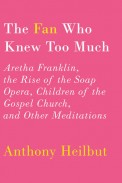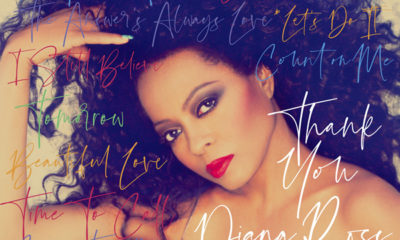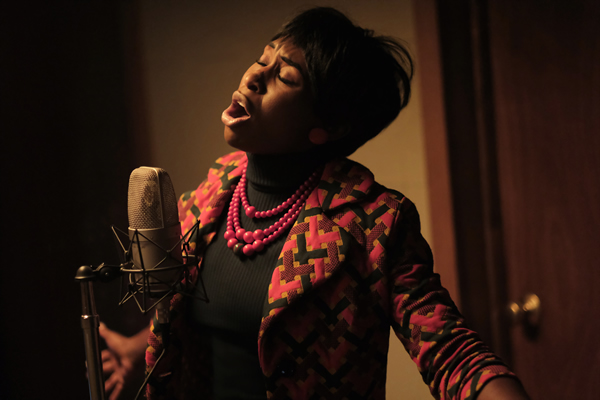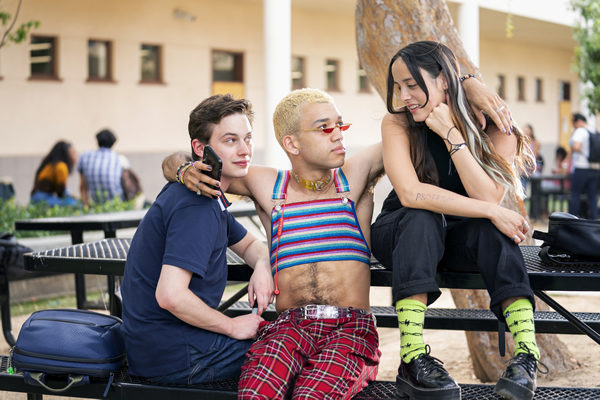Arts & Entertainment
Life-long ‘Fan’
Gay writer explores, Aretha, gays in black gospel and more
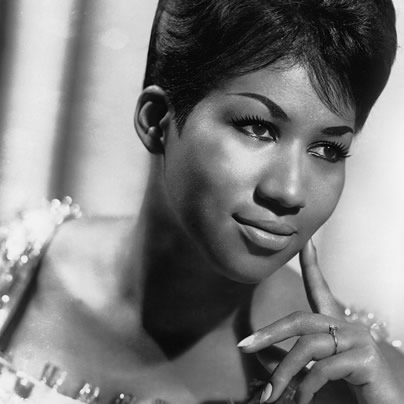
‘The Fan Who Knew Too Much’
By Anthony Heilbut
Knopf
$30
354 pages
anthonyheilbut.comAretha Franklin concert
Saturday, Nov. 17
7:30 p.m.
DAR Constitution Hall
1776 D Street, NW
$59.50-115.50
ticketmaster.com
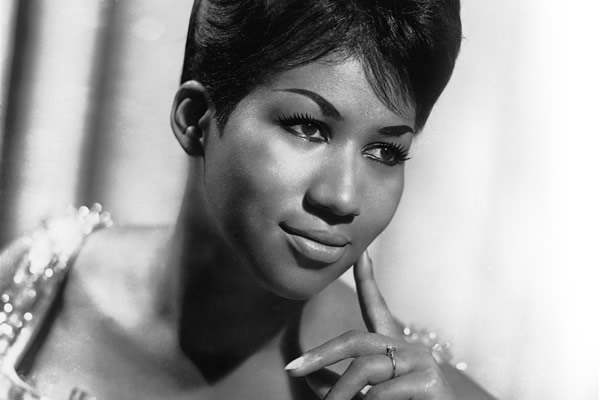
Vintage early ’60s promo still of Aretha Franklin during her Columbia Records years. (Photo courtesy of Sony Music Entertainment)
In a roundabout way, there’d be no rock music without gays and lesbians.
That’s the assertion of gay New York-based writer/historian Anthony Heilbut. In a sprawling, juicy tome that’s as gossipy and anecdotal as it is academic, he writes in “The Fan Who Knew Too Much” that there would have been no golden age of black gospel music (roughly1945-1960) without gays. He, and other rock historians also assert there’d be no mainstream rock and roll without classic black gospel influence.
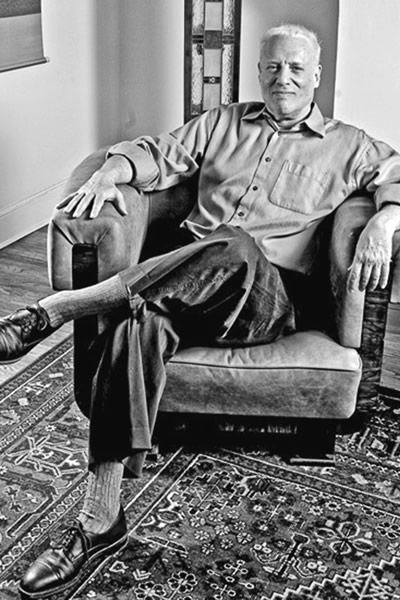
Gay author Anthony Heilbut says Franklin’s underrated work at Columbia Records is her best, contrary to popular opinion, which venerates her later Atlantic Records period. (Photo by Stephen Ladner)
“It means a lot to me that gay people know about this,” Heilbut says during a lengthy phone chat last week. “Gospel is really the most essential American music. Everyone sort of understands that black church singing, it’s really been the center of American singing since the 19th century. It follows through in jazz as well. It’s a great gay contribution.”
Though white and an atheist, as a teen, Heilbut went to hear the great R&B and soul acts of the day at the Apollo in New York. He was often the only white person in the room. He got a heads up from the ushers.
“I think they kind of took pity on this lone white boy,” he says. “They said, if you dig this, you ain’t heard nothin’ yet, the gospel shows are so much better. The showmanship, the vocalism. I came to know almost all the singers and became absolutely enthralled. They were so much more dynamic than their secular counterparts. You just cannot imagine rock and roll and R&B without the influence of these singers.”
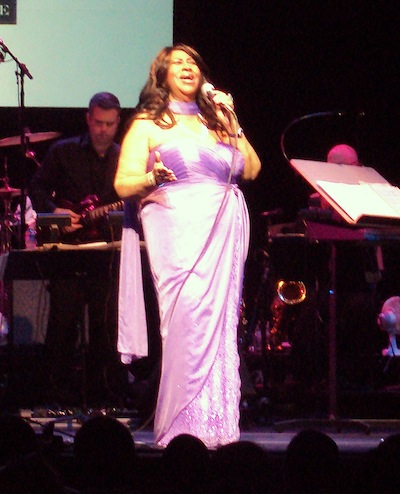
Aretha in concert at Wolf Trap, summer 2011, the last time she played the D.C. market. (Blade file photo by Joey DiGuglielmo)
Heilbut’s book, out earlier this year, is a collection of lengthy essays. Subtitled “Aretha Franklin, the Rise of the Soap Opera, Children of the Gospel Church and Other Meditations,” it includes a lengthy essay on how many black gospel legends — figures like James Cleveland, Clara Ward and others were either gay, lesbian or bi. In the essay “Aretha: How She Got Over” he explores how the soul legend — in town this weekend for a concert at DAR Constitution Hall — integrated the styles of the gospel legends she admired as a teen into the hit secular records she later recorded at Columbia and Atlantic. Though Franklin’s gospel roots are well known, Heilbut extrapolates the richness of those influences in unprecedented ways.
Other essays explore writer Thomas Mann (“The Magic Mountain”), the phenomenon of the male soprano and late soap opera maven Irna Phillips.
One senses, however, that despite Heilbut’s many interests and decades — he’s 71 — of following the careers of many, his heart is most deeply rooted in the gospel music of his youth. He eventually produced records for some of his favorites and writes and shares movingly of not only their great talent, but the hypocrisy with which the church has dealt with — often with scorn and outright condemnation — the contributions of its gay musicians.
Typical of many of the “old school” black gospel establishment, Heilbut quotes the legendary Shirley Caesar as “beseeching the ‘sissies and bull daggers’ to ‘come up and be saved,’ and warning that homosexuals were ‘stealing our children.’”
More analysis than biography, though, Heilbut illustrates how a lifetime of following a singer or musical phenomenon can result in an uncanny insight that the subjects themselves are often loathe to discuss — Franklin, as journalists and long-time fans know, is famously prickly and evasive on many topics.
For the record, Heilbut says Franklin and her legendary father, Rev. C.L. Franklin who became a mid-century legend as pastor of Detroit’s New Bethel Baptist Church — were way more accepting of gays than many others in the era.
Heilbut says Franklin, though not as vocal as some, has made her gay support known in several ways — from singing at a recent same-sex wedding to inviting gay-welcoming clergy (Bishop Carlton Pearson) to comment during a Whitney Houston tribute she hosted during a concert at Radio City Music Hall while Houston’s mother, Cissy, stuck with old school, anti-gay leaders (TD Jakes, Donnie McClurkin) at her daughter’s funeral.
“Aretha does these little things without really saying a word,” Heilbut says.
Books
Love or fear flying you’ll devour ‘Why Fly’
New book chronicles a lifetime obsession with aircraft

‘Why Fly’
By Caroline Paul
c. 2026, Bloomsbury
$27.99/256 pages
Tray table folded up.
Check. Your seat is in the upright position, the airflow above your head is just the way you like it, and you’re ready to go. The flight crew is making final preparations. The lights are off and the plane is backing up. All you need now is “Why Fly” by Caroline Paul, and buckle up.

When she was very young, Paul was “obsessed” with tales of adventure, devouring accounts written by men of their derring-do. The only female adventure-seeker she knew about then was Amelia Earhart; later, she learned of other adventuresome women, including aviatrix Bessie Coleman, and Paul was transfixed.
Time passed; Paul grew up to create a life of adventure all her own.
Then, the year her marriage started to fracture, she switched her obsession from general exploits to flight.
Specifically, Paul loves experimental aircraft, some of which, like her “trike,” can be made from a kit at home. Others, like Woodstock, her beloved yellow gyrocopter, are major purchases that operate under different FAA rules. All flying has rules, she says, even if it seems like it should be as freewheeling as the birds it mimics.
She loves the pre-flight checklist, which is pure anticipation as well as a series of safety measures; if only a relationship had the same ritual. Paul loves her hangar, as a place of comfort and for flight in all senses of the word. She enjoys thinking about historic tales of flying, going back before the Wright Brothers, and including a man who went aloft on a lawn chair via helium-filled weather balloons.
The mere idea that she can fly any time is like a gift to Paul.
She knows a lot of people are terrified of flying, but it’s near totally safe: generally, there’s a one in almost 14 million chance of perishing in a commercial airline disaster – although, to Paul’s embarrassment and her dismay, it’s possible that both the smallest planes and the grandest loves might crash.
If you’re a fan of flying, you know what to do here. If you fear it, pry your fingernails off the armrests, take a deep breath, and head to the shelves. “Why Fly” might help you change your mind.
It’s not just that author Caroline Paul enjoys being airborne, and she tells you. It’s not that she’s honest in her explanations of being in love and being aloft. It’s the meditative aura you’ll get as you’re reading this book that makes it so appealing, despite the sometimes technical information that may flummox you between the Zen-ness. It’s not overwhelming; it mixes well with the history Paul includes, biographies, the science, heartbreak, and exciting tales of adventure and risk, but it’s there. Readers and romantics who love the outdoors, can’t resist a good mountain, and crave activity won’t mind it, though, not at all.
If you own a plane – or want to – you’ll want this book, too. It’s a great waiting-at-the-airport tale, or a tuck-in-your-suitcase-for-later read. Find “Why Fly” and you’ll see that it’s an upright kind of book.
The Blade may receive commissions from qualifying purchases made via this post.
Theater
Out actor Kevin Cahoon on starring role in ‘Chez Joey’
Arena production adapted from Broadway classic ‘Pal Joey’

‘Chez Joey’
Through March 15
Arena Stage
1101 Sixth St., S.W.
Tickets start at $93
Arenastage.org
As Melvin Snyder in the new musical “Chez Joey,” out actor Kevin Cahoon plays a showbiz society columnist who goes by the name Mrs. Knickerbocker. He functions as a sort of liaison between café society and Chicago’s Black jazz scene circa 1940s. It’s a fun part replete with varied insights, music, and dance.
“Chez Joey” is adapted from the Broadway classic “Pal Joey” by Richard Rodgers and Lorenz Hart. It’s inspired by John O’Hara’s stories based on the exploits of a small-time nightclub singer published in The New Yorker.
A warm and humorous man, Cahoon loves his work. At just six, he began his career as a rodeo clown in Houston. He won the Star Search teen division at 13 singing songs like “Some People” from “Gypsy.” He studied theater at New York University and soon after graduating set to work playing sidekicks and comedic roles.
Over the years, Cahoon has played numerous queer parts in stage productions including “Hedwig and the Angry Inch,” “La Cage aux Folles,” “Rocky Horror” as well as Peanut in “Shucked,” and George the keyboardist in “The Wedding Singer,” “a sort of unicorn of its time,” says Cahoon.
Co-directed by Tony Goldwyn and the great Savion Glover, “Chez Joey” is a terrific and fun show filled with loads of talent. Its relevant new book is by Richard Lagravenese.
On a recent Monday off from work, Cahoon shared some thoughts on past and current happenings.
WASHINGTON BLADE: Is there a through line from Kevin, the six-year-old rodeo clown, to who we see now at Arena Stage?
KEVIN CAHOON: Anytime I want to land a joke in a theater piece it goes back to that rodeo clown. It doesn’t matter if it’s Arena’s intimate Kreeger Theatre or the big rodeo at the huge Houston Astrodome.
I was in the middle stadium and there was an announcer — a scene partner really. And we were doing a back and forth in hopes of getting laughs. At that young age I was trying to understand what it takes to get laughs. It’s all about timing. Every line.
BLADE: Originally, your part in “Chez Joey” Melvin was Melba who sings “Zip,” a clever woman reporter’s song. It was sort of a star feature, where they could just pop in a star in the run of “Pal Joey.”
CAHOON: That’s right. And in former versions it was played by Martha Plimpton and before her Elaine Stritch. For “Chez Joey,” we switched gender and storyline.
We attempted to do “Zip” up until two days before we had an audience at Arena. Unexpectedly they cut “Zip” and replaced it with a fun number called “I Like to Recognize the Tune,” a song more connected to the story.
BLADE: Wow. You must be a quick study.
CAHOON: Well, we’re working with a great band.
BLADE: You’ve played a lot of queer parts. Any thoughts on queer representation?
CAHOON: Oh yes, definitely. And I’ve been very lucky that I’ve had the chance to portray these characters and introduce them to the rest of the world. I feel honored.
After originating Edna, the hyena on Broadway in “The Lion King,” I left that to do “Hedwig and the Angry Inch” as standby for John Cameron Mitchell, doing one show a week for him.
Everyone thought I was crazy to leave the biggest musical of our time with a personal contract and getting paid more money that I’d ever made to get $400 a week at the downtown Jane Street Theatre in a dicey neighborhood.
At the time, I really felt like I was with cool kids. I guess I was. And I never regretted it.
BLADE: When you play new parts, do you create new backstories for the role?
CAHOON: Every single time! For Melvin, I suggested a line about chorus boys on Lakeshore Drive.
BLADE: What’s up next for Kevin Cahoon?
CAHOON: I’m about to do the New York Theatre Workshop Gala; I’ve been doing it for nine years in a row. It’s a huge job. I’ll also be producing the “Cats: The Jellicle Ball” opening on Broadway this spring; it’s a queer-centric uptown vogue ball with gay actor André de Shields reprising his role as “Old Deuteronomy.”
BLADE: There’s a huge amount of talent onstage in “Chez Joey.”
CAHOON: There is. I’m sharing a dressing room with Myles Frost who plays Joey. He won accolades for playing Michael Jackson on Broadway. We’ve become great friends. He’s a miracle to watch on stage. And Awa [Sal Secka], a D.C. local, is great. Every night the audience falls head over heels for her. When this show goes to New York, Awa will, no doubt, be a giant star.
BLADE: Do you think “Chez Joey” might be Broadway bound?
CAHOON: I have a good feeling it is. I’ve done shows out of town that have high hopes and pedigree, but don’t necessarily make it. “Chez Joey” is a small production, it’s funny, and audiences seem to love it.

The Capital Pride Alliance held the annual Pride Reveal event at The Schuyler at The Hamilton Hotel on Thursday, Feb. 26. The theme for this year’s Capital Pride was announced as: “Exist. Resist. Have the audacity!”
(Washington Blade photos by Michael Key)























-

 Federal Government4 days ago
Federal Government4 days agoTwo very different views of the State of the Union
-

 Virginia4 days ago
Virginia4 days agoVa. activists preparing campaign in support of repealing marriage amendment
-

 Opinions4 days ago
Opinions4 days agoThe global cost of Trump’s foreign aid ideology
-

 Movies3 days ago
Movies3 days agoMoving doc ‘Come See Me’ is more than Oscar worthy

